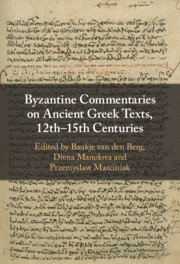Book contents
- Byzantine Commentaries on Ancient Greek Texts, 12th–15th Centuries
- Byzantine Commentaries on Ancient Greek Texts, 12th–15th Centuries
- Copyright page
- Contents
- Contributors
- Introduction Byzantine Commentaries on Ancient Greek Texts
- Chapter 1 The Politics and Practices of Commentary in Komnenian Byzantium
- Chapter 2 Forging Identities between Heaven and Earth
- Chapter 3 Cultural Appropriation and the Performance of Exegesis in John Tzetzes’ Scholia on Aristophanes
- Chapter 4 Uncovering the Literary Sources of John Tzetzes’ Theogony
- Chapter 5 Odysseus the Schedographer
- Chapter 6 Eustathios of Thessalonike on Comedy and Ridicule in Homeric Poetry
- Chapter 7 Geography at School
- Chapter 8 Painting and Polyphony
- Chapter 9 Parodying Antiquity for Pleasure and Learning
- Chapter 10 Teaching Poetry in the Early Palaiologan School
- Chapter 11 Late Byzantine Scholia on the Greek Classics
- Chapter 12 Theodora Raoulaina’s Autograph Codex Vat. gr. 1899 and Aelius Aristides
- Chapter 13 The Reception of Eustathios of Thessalonike’s Parekbolai in Arsenios Apostolis’ and Erasmus’ Paroemiographic Collections
- Index
- References
Chapter 13 - The Reception of Eustathios of Thessalonike’s Parekbolai in Arsenios Apostolis’ and Erasmus’ Paroemiographic Collections
Published online by Cambridge University Press: 07 August 2023
- Byzantine Commentaries on Ancient Greek Texts, 12th–15th Centuries
- Byzantine Commentaries on Ancient Greek Texts, 12th–15th Centuries
- Copyright page
- Contents
- Contributors
- Introduction Byzantine Commentaries on Ancient Greek Texts
- Chapter 1 The Politics and Practices of Commentary in Komnenian Byzantium
- Chapter 2 Forging Identities between Heaven and Earth
- Chapter 3 Cultural Appropriation and the Performance of Exegesis in John Tzetzes’ Scholia on Aristophanes
- Chapter 4 Uncovering the Literary Sources of John Tzetzes’ Theogony
- Chapter 5 Odysseus the Schedographer
- Chapter 6 Eustathios of Thessalonike on Comedy and Ridicule in Homeric Poetry
- Chapter 7 Geography at School
- Chapter 8 Painting and Polyphony
- Chapter 9 Parodying Antiquity for Pleasure and Learning
- Chapter 10 Teaching Poetry in the Early Palaiologan School
- Chapter 11 Late Byzantine Scholia on the Greek Classics
- Chapter 12 Theodora Raoulaina’s Autograph Codex Vat. gr. 1899 and Aelius Aristides
- Chapter 13 The Reception of Eustathios of Thessalonike’s Parekbolai in Arsenios Apostolis’ and Erasmus’ Paroemiographic Collections
- Index
- References
Summary
From Late Antiquity onward many Homeric verses and phrases were considered to have a proverbial value and as such were employed as independent witty sayings. While the use of these Homeric proverbs in Byzantine writings has yet to be thoroughly investigated, in the early sixteenth century these expressions were gathered in paroemiographical collections. These include Erasmus’ Adagia and Arsenios Apostolis’ Violarium, two works which seem to be interdependent in this respect. Apostolis copied many Homeric verses and their accompanying scholia into the margins of Paris, Bibliothèque nationale, gr. 3058, with the intention to add another section to the four existing typologies (proverbs, maxims, apothegms and anecdotes). In doing so, he explored and exploited available sources, such as the Commentaries on Homer by Eustathios of Thessalonike. The criteria according to which Apostolis organized the proverbs, as well as his creation of a separate section on Homeric proverbial verses, were innovations in Greek literature. This chapter explores the textual relationship between Apostolis’ compilation and the long exegetical tradition on Homer. More particularly, it will demonstrate how Eustathios’ works were preserved and adapted to the expectations of a new era.
Keywords
- Type
- Chapter
- Information
- Publisher: Cambridge University PressPrint publication year: 2022
References
- 14
- Cited by

